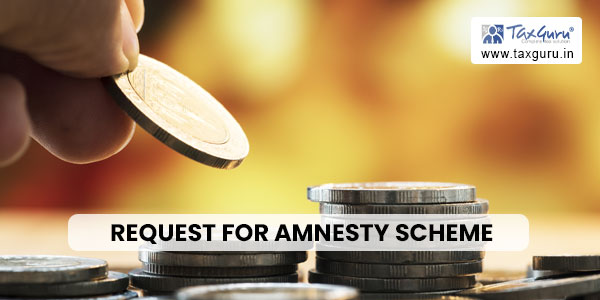
In the realm of taxation, the landscape can often be fraught with complexities and uncertainties. One such issue that has been a cause for concern among taxpayers is related to the Input Tax Credit (ITC) claims under the Goods and Services Tax (GST) regime. While courts have rendered judgments on this matter, questions remain about the fairness and interpretation of the law.
In the realm of taxation, the landscape can often be fraught with complexities and uncertainties. One such issue that has been a cause for concern among taxpayers is related to the Input Tax Credit (ITC) claims under the Goods and Services Tax (GST) regime. While courts have rendered judgments on this matter, questions remain about the fairness and interpretation of the law.
This representation delves into the challenges faced by taxpayers in claiming ITC and the pressing need for clarity in understanding the nuances of the law. Additionally, it highlights a call for the introduction of an amnesty scheme to alleviate the burden on affected taxpayers.
Dear Sir/Madam,
Sub: Request for Amnesty Scheme and Withdrawal of Notices under 16(4)
I would like to draw your kind attention to the fact that various taxpayers throughout the country are receiving notices from GST, among which one major problem is occurring with Section 16(4) of the act.
Before proceeding with the matter at hand, I would like to state that in the current environment, a taxpayer cannot take or claim their Input or inward purchases without the payment of tax. Consequently, if they are facing some financial crisis in paying their tax, they cannot file returns.
1. The law specifies two terms: "Take" and "Claim" in different sections.
2. Section 16(4) states that the taking of Input Tax Credit (ITC) will not be allowed after the 20th of October of the next financial year.
3. There is no provision for revised returns, and thus, Section 39(9) states that if a taxpayer realizes that they have forgotten to take ITC, they can do so before filing the September return of the next year.
4. When the law was initially approved, there was a provision for filing GSTR 1 for output details, GSTR 2 for inward details (where ITC was to be taken), and GSTR 3 for ITC claims and adjusting the output liability and paying applicable taxes (i.e., Input Claim and Output offset).
5. According to this framework, even if a taxpayer faced financial problems in paying taxes, they could continue filing GSTR 2 and take their ITC.
6. This means that fund problems would not have been an issue for taxpayers to Take ITC.

7. It is important to note that the law does not prohibit the claiming of ITC, and the claiming is done when GSTR 3B is furnished. Taking ITC is related to books of accounts and the furnishing of GSTR 2. Once a taxpayer is allowed to file GSTR 2, they would take the same. Section 42(3) explicitly mentions that if the input tax credit claimed by a recipient is in excess of the tax declared by the supplier for the same supply, or the outward supply is not declared by the supplier in their valid returns, the discrepancy shall be communicated to both parties and matched by the system.
8. After completing the process of taking Input Tax Credit, one has to claim the same and offset their liability in GSTR 3.
9. As there is currently no system for filing GSTR 2, there is no option for taxpayers to take ITC. Presently, the details furnished by the seller are considered valid, and only that amount is allowed to be claimed. This means that the action that was supposed to be done through GSTR 2, i.e., taking of ITC, is now done by default, and there is no process to take the ITC.
10. After this step, the next is to claim the ITC if it is eligible and not claim or do a reversal if it is not allowed to be claimed.
11. The law nowhere mentions that the claiming of ITC will not be accepted after the 20th of October.
12. Furthermore, when a taxpayer is filing a return for any particular month, they are doing so assuming that they are filing the return on the applicable due date. If the date is breached, they are penalized by late fees and interest. Therefore, the offense they have committed is penalized by late fees, and their bonafide claim cannot be denied.
However, the Department is now issuing notices to taxpayers who have claimed ITC in GSTR 3B after the 20th of October of the next financial year.
Sir, the Gazette does not mention that the claim of ITC will be disallowed. Therefore, I believe that this provision has been wrongly interpreted by the tax authorities, which is increasing the problems of honest taxpayers.
This situation requires immediate redressal, as if the department starts taking strict actions, such as raising demands and blocking ITC, many taxpayers will not be in a position to file returns, causing a cascading impact on numerous taxpayers.
Many taxpayers have challenged the validity of Section 16(4), and more cases are expected to arise. At this point, I must draw attention to the fact that even before any amount is forfeited by a bank or shareholders' benefit, notices are sent to the owner to claim their dues; otherwise, the same will be transferred to special funds. Thus, before the expiry of the date, the department should send notices that the ITC will be forfeited and that the claiming process should be made easier, especially for taxpayers facing financial problems.
Given the ambiguity and genuine problems faced during the initial implementation of GST, I request that an amnesty scheme be announced. Additionally, I request that a deemed assessment of the initial three years be conducted to put an end to ongoing disputes with taxpayers.
The interest on GST is very high, and I request that it be reduced to a reasonable rate of 4-6%, as businesses do not have such high margins that they can afford an 18% interest rate.
